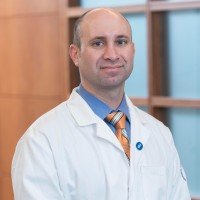The Department of Pathology and Laboratory Medicine at Memorial Sloan Kettering Cancer Center offers a Thoracic Pathology Fellowship Training Program. A clinical year is accredited by the Accreditation Council for Graduate Medical Education (ACGME). A second optional research year focuses on the molecular biology of thoracic disease. All fellows should have completed training in anatomic pathology and be certified (or eligible for certification) by the American Board of Pathology prior to applying for this fellowship.
Memorial Sloan Kettering Cancer Center is recognized nationally and internationally for its expertise in pathologic diagnosis of pulmonary, pleural, and mediastinal diseases. In addition to outstanding Thoracic Pathologists, the in-house hospital-based Thoracic Disease Management Team (DMT) consists of a world-class group of thoracic surgeons, oncologists, radiologists, radiation therapists, and molecular biologists. A high volume of quality in-house surgical and consultation pathology material provides a strong foundation for this training program.
For the first time there will be two Thoracic Pathology Fellows each year with 50% time spent on clinical work and 50% on translational research projects.
Download a Thoracic Pathology Fellowship Program brochure.
Clinical Training Year
During the year of clinical training, the fellow will be responsible for running the consultation services of the thoracic pathologists. This clinical service consists of second opinion consultations on difficult neoplastic and non-neoplastic pulmonary, pleural, and mediastinal specimens. In addition, the fellow will observe and provide assistance to the oncologic surgical pathology fellows who are rotating on the thoracic in-house service. The consultations provide a broad spectrum exposure to non-neoplastic as well as neoplastic material, thus providing an excellent supplement to the hospital-based thoracic material fellows will encounter.
Many of the consultation cases and a substantial percentage of the in-house cases are complex and require ancillary techniques such as histochemical and/or immunohistochemical and molecular studies as well as clinical or radiologic correlation. In addition, there are frequent opportunities for interaction with all four of the senior staff, with many educational discussions about diagnostic criteria, differential diagnoses, recent pertinent publications, and the limitations of existing classification systems. A study set of 1000 cases of pulmonary, mediastinal, and pleural specimens, including many rare entities, is also available for study.
We also have conferences featuring outstanding thoracic radiologists who discuss consultations that include chest radiologic images, as well as weekly conferences with clinical staff (surgeons, radiologists, oncologists, etc.) to discuss current cases. These conferences allow for exposure to a dynamic integrated approach to the diagnosis of a variety of thoracic entities, including non-neoplastic lung disease.
During the clinical year, the fellows are expected to complete at least one research project that should result in an article for publication in the medical literature. The project should be based on the large volume of outstanding archival and current clinical material for both neoplastic and non-neoplastic thoracic diseases. The fellow is also expected to give a presentation of this research at a departmental conference, and he or she will submit an abstract which will be presented at the United States and Canadian Academy of Pathology annual meeting.
Objectives
- To provide training in diagnostic thoracic pathology including both neoplastic and non-neoplastic disorders.
- To understand problem areas in thoracic pathology that need to be solved by carefully designed research projects.
- To learn how to design a research project, to execute the idea, collect and organize the data, analyze the data, formulate a conclusion and write a paper.
- To learn how to manage an efficient, high-quality diagnostic pathology consultation service.
- To learn how to interact with thoracic physicians in other disciplines to achieve the correct diagnosis in complex cases.
Faculty
Availability
2026
Deadline
July 31
Number of Positions
3
How to Apply
Once applicants have submitted their applications, they will need to send the following documents in order to be considered for a fellowship position:
- Three letters of recommendation from an institution in which the applicant has trained. Letters should be addressed to Dr. William Travis the program director. Please request letter writers add the following line after the heading (RE: Candidates Name, Program & Year Applying to)
- CV
- Copy of a medical school diploma and translation, if necessary.
- International medical school graduates must submit a copy of their Educational Commission for Foreign Medical Graduates (ECFMG) certificate that is marked “valid indefinitely”






